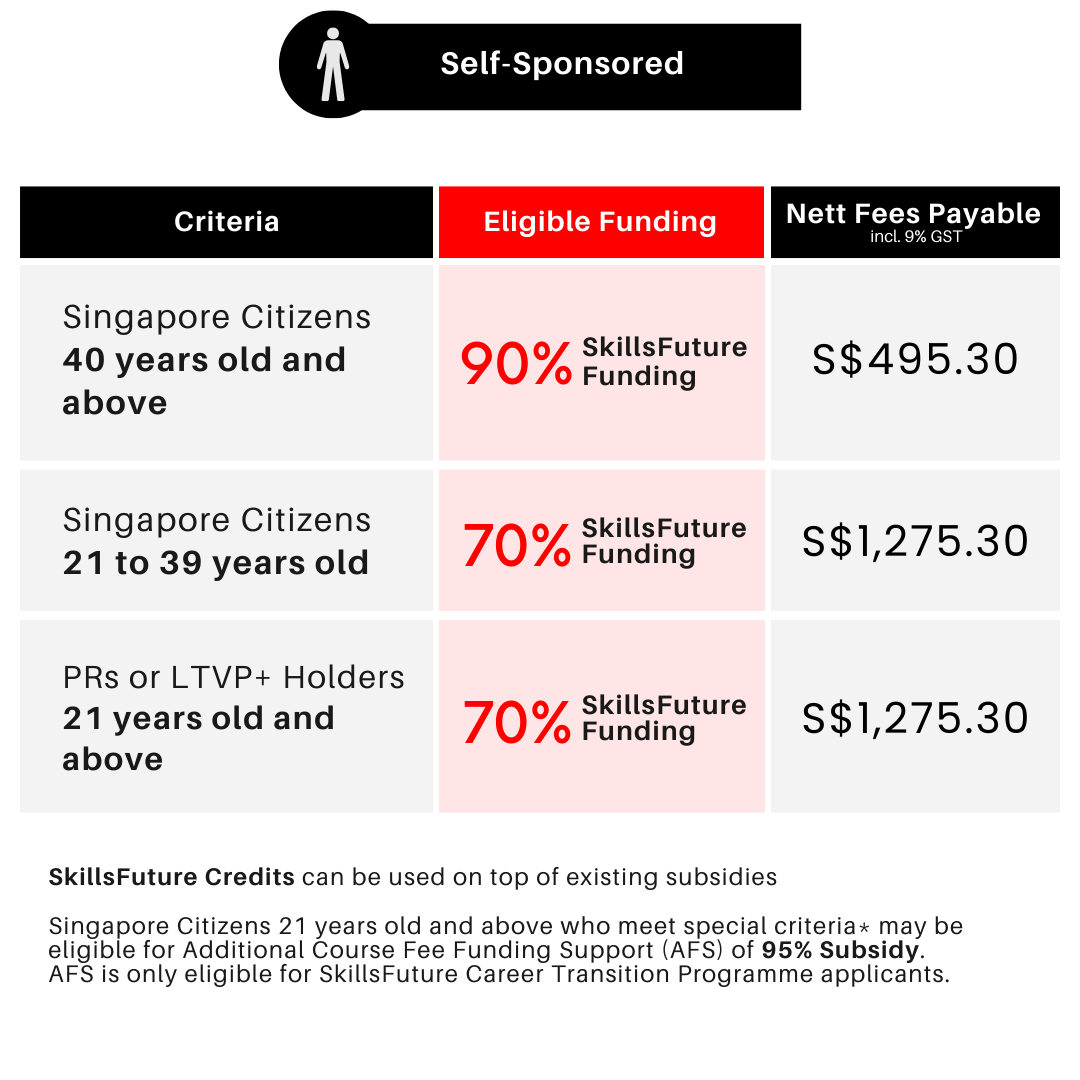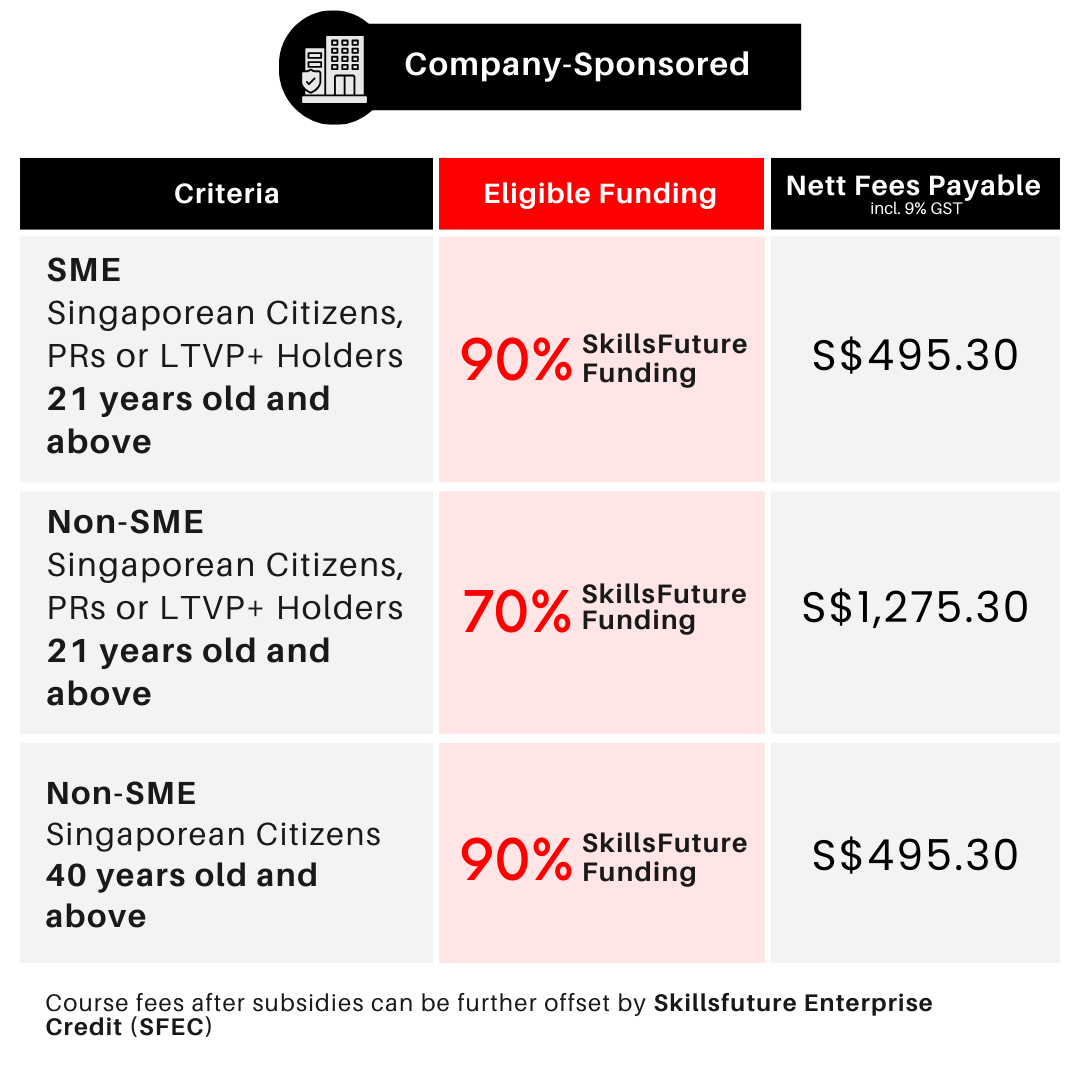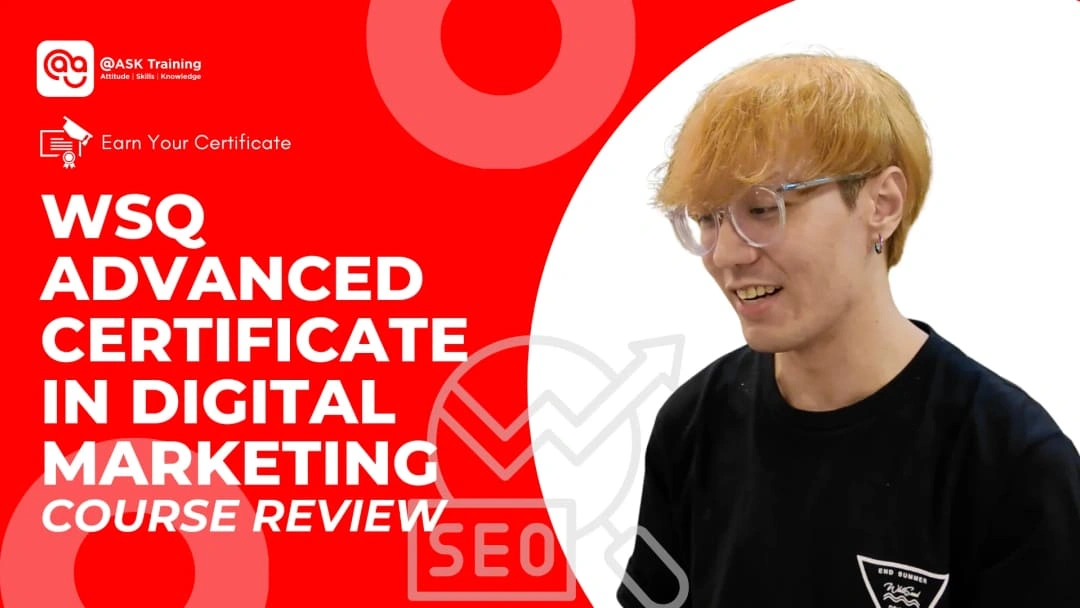Elevate your career and become a Certified Digital Marketing Strategist with our intensive WSQ Advanced Certificate in Infocomm Technology (Sales and Marketing) programme. In just one month, you’ll embark on a transformative journey through five comprehensive modules, totalling 85 hours of in-depth training.
Our certified programme begins with “Digital Marketing Essentials,” where you’ll grasp the fundamentals of digital marketing, from strategy creation to analytics. You’ll have the opportunity to develop a practical digital marketing plan, ensuring you’re ready to apply your knowledge in real-world scenarios. Next, “Digital Advertising” will take you into the world of digital media planning and advertising strategies, including hands-on application.
In “Social Media Marketing,” you’ll master the art of creating engaging content and building brand influence across various platforms. Following that, “Search Engine Optimisation (SEO)” will equip you with the skills to boost a website’s organic search rankings. The journey concludes with “Digital Marketing Analytics,” where you’ll learn how to measure campaign performance and be able to transform these data into actionable insights.
Whether you’re advancing your career or starting a new one, our certified programme will empower you with the skills and knowledge to excel in the ever-evolving digital marketing landscape.
Enrolment Requirement:
To enrol in this WSQ Advanced Certificate in InfoComm Technology (Sales & Marketing), you should possess the following:
Assessment Method:
Written assessment (i.e., Short Questions & Answers & Case study) & Individual Project Assignment.
 Industry-recognised WSQ Statement of Attainments
Industry-recognised WSQ Statement of Attainments
 Comprehensive, up-to-date curriculum and courseware
Comprehensive, up-to-date curriculum and courseware
 Real-world hands-on projects
Real-world hands-on projects
 Career advisory and resources support
Career advisory and resources support
Gain foundational digital marketing proficiency through course covering the fundamental pillars of digital marketing. Learn everything including key concepts, strategies, and analytical tools for building a strong foundation in the digital marketing landscape.
Upon completion of this course, trainees should be able to utilise marketing mix frameworks to:
At the end of the module, the trainees should be able to demonstrate proficiency in conducting digital marketing mix analysis for a Startup.
Learn how to create compelling campaigns that captivate audience across various digital platforms while tracking your performance to make strategic and cost-effective decisions. Discover insights from real-world case studies and identify opportunities for your brand.
Upon completion of this course, trainees should be able to utilise marketing mix frameworks to:
At the end of the module, the trainees should be able to formulate and execute a digital advertising strategy.
Get into the strategies and trends of social media marketing, mastering how to utilise platforms like Facebook, Instagram, TikTok, and many more for effective brand engagement and growth.Learn how to attract customers and prospects, deepen customer relationships, and increase brand awareness through proven social media marketing frameworks
Upon completion of this course, trainees should be able to utilise marketing mix frameworks to:
At the end of this module, you should be able to formulate and execute a digital advertising strategy.
Learn how to optimise and rank your website on Google. Explore both technical and creative elements of SEO and gain practical experience in executing campaigns for improved visibility. Discover the KPIs and metrics needed to measure, analyse and further optimise your SEO campaigns.
Upon completion of this course, trainees should be able to utilise marketing mix frameworks to:
At the end of this module, you should be able to apply fundamental SEO techniques to improve a website’s visibility in search engines.
Gain insights into digital marketing analytics by using Google Analytics 4. Develop the skills to analyse and interpret both qualitative and quantitative data, enabling you to make data-driven marketing decisions to maximise your ROI.
Upon completion of this course, trainees should be able to utilise marketing mix frameworks to:
At the end of this module, you should be able to utilise Google Analytics to gather data for analysis, including interpreting diverse digital and market data types.
I completed the WSQ Advanced Certificate in Infocomm Technology (Sales and Marketing) at @ASK Training in March 2024, and it was a great learning experience. This course is a good starting point for anyone who wants to begin their journey in digital marketing.
The trainers were knowledgeable and shared real-life examples that made the lessons practical and easy to understand. The course covered key topics, from digital marketing basics to useful IT tools, giving me the confidence to apply what I learned immediately.
If you’re looking to build a solid foundation in digital marketing and technology, this course is a perfect choice to get started. ![]()
I attended this 1 month WSQ Digital Marketing programme at ASK Training, International Plaza, and the experience was fantastic. All the lecturers are very engaging and shared their personal journeys in the digital marketing world. They even offered to help students after the course if we faced difficulties in setting up our websites.
Attended my very first few Digital Marketing courses here at JTC Summit. My trainers, Raymond Teoh, Timothy, Martin and David Boh are all awesome 😎 They each make their lessons interesting in their own ways, which makes it fun, a lot easier to digest and learn better.




The Singapore Workforce Skills Qualification (WSQ) Advanced Certificate in Digital Marketing is a comprehensive digital marketing training program designed to equip participants with advanced skills and knowledge. It covers a wide range of topics including social media marketing, search engine optimisation (SEO), digital marketing analytics, and more.
Yes, participants will be required to complete assessments throughout the programme to demonstrate their understanding of the course material and pass the assessments to earn a SkillsFuture WSQ Statement of Attainment
Eligibility for enrollment includes individuals who meet one of the following criteria:
🔴 Possess at least a GCE ‘O’ level or equivalent qualification and are at least 21 years old.
🔴 Have completed NITEC/Higher NITEC and are at least 21 years old.
🔴 Are mature candidates, aged 30 or above, with a minimum of 8 years of work experience.
🔴 Candidates with other qualifications will be considered on a case-by-case basis.
Additionally, applicants are required to have basic computer skills. While not mandatory, a fundamental understanding of sales and marketing concepts would be advantageous.
Yes, this programme is designed to equip learners who have little or no prior knowledge of digital marketing with a solid foundation in the various pillars of digital marketing.
The SkillsFuture Career Transition Programme (SCTP) supports mid-career individuals in acquiring industry-relevant skills to improve employability and pivot to new sectors or job roles.
You can choose to study part-time or full-time, depending on what suits you best, and the programme lasts between 3 to 12 months.
This ensures individuals like you have the opportunity to upskill or re-skill while effectively preparing for successful career transitions.
For more information on SkillsFuture Career Transition Programmes (SCTP), visit the MySkillsFuture website.
The SkillsFuture Career Transition Programme (SCTP) provides funding support for mid-career individuals looking to upskill or re-skill in high-demand sectors such as digital marketing.
Eligible individuals can receive up to 95% in subsidies for the course fees, making the Advanced Certificate in Digital Marketing more affordable for those looking for a mid-career switch or seeking to enhance their skill sets for new job opportunities.
Yes, participants may utilise their SkillsFuture Credit to offset the course fees for the Advanced Certificate in Digital Marketing. Participants may also use PSEA and UTAP to offset the balance fees. For more information on the course funding options that are available to you, click on the Course Fee and Funding tab.
| WSQ Advanced Certificate in InfoComm Technology (Sales & Marketing) | |
|---|---|
| Fee Excluding GST | $3,900.00 |
| For Singaporeans > 21 | $1,170.00 |
| For Singaporeans > 40 | $390.00 |
| For Foreigners | $3,900.00 |

Graduate with a recognised certificate

Experience real-world application through hands-on projects with real project partners

Learning materials are vetted by our Dean to ensure relevant and up-to-date curriculum

Gain one-on-one coaching by our mentors when completing your capstone project

Personalised career advise and support to assist in your job search

Trainers are hand-picked industry experts who are certified trainers, offering real-world insights


Bachelor's of Computing in Information System National University of Singapore


Bachelor's of Computing in Information System National University of Singapore


Bachelor's of Computing in Information System National University of Singapore


Bachelor's of Computing in Information System National University of Singapore


If you’re thinking about taking your next step but are still unsure of which programme suits your needs best, our programme consultants are available to guide you through your learning journey.
Speak to us now to find out more!

